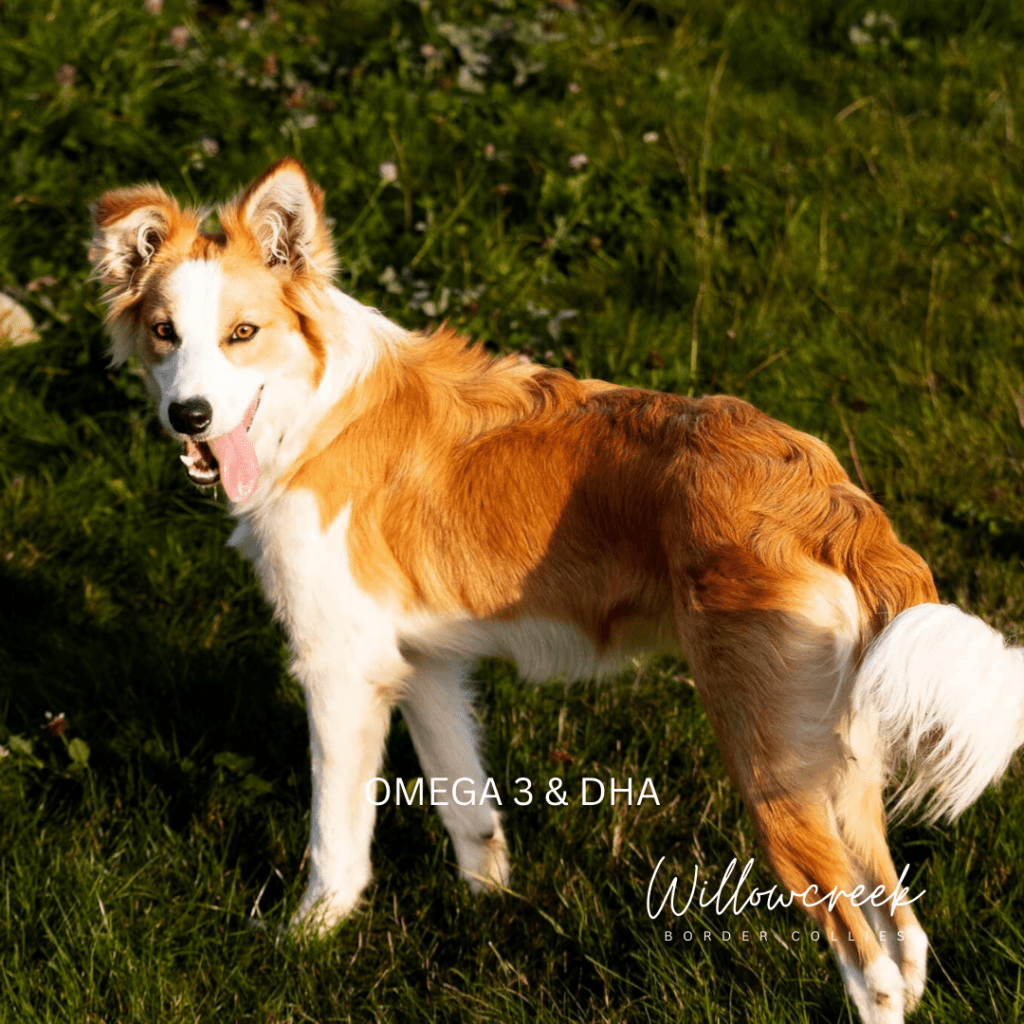Supplements for Border Collies
Our four-legged companions bring boundless joy into our lives, and as responsible pet parents, we strive to ensure they live their best, healthiest lives possible. Alongside a balanced diet and regular exercise, supplements can play a pivotal role in supporting your dog’s overall well-being.
However, like any health regimen, understanding what supplements are, their benefits, and how to use them safely is essential.
Understanding Border Collie Dog Supplements:
 There are dozens of supplements on the market for Border Collies and Border Collie puppies. Many are not needed and some are honestly just a a marketing gimmick.
There are dozens of supplements on the market for Border Collies and Border Collie puppies. Many are not needed and some are honestly just a a marketing gimmick.
Quality supplements are additional nutrients, vitamins, minerals, and herbal extracts that can complement your pet’s diet. They come in various forms including pills, powders, liquids, and treats. These supplements are designed to address specific health concerns, enhance overall wellness, and fill potential gaps in your dog’s nutrition.
Key Supplements for Border Collies:
1. Omega-3 Fatty Acids Supplements:
Omega-3s, commonly found in fish oil supplements, support healthy skin and coat, reduce inflammation, and promote joint health. They are particularly beneficial for dogs with skin allergies, arthritis, or inflammatory conditions.
2. Glucosamine and Chondroitin Supplements:
These supplements are popular for supporting joint health and mobility, especially in senior dogs or breeds prone to hip dysplasia or arthritis. They help maintain cartilage integrity and reduce joint pain and stiffness.
3. Probiotics and Digestive Enzymes:
Just like in humans, probiotics and digestive enzymes promote a healthy gut flora, aiding in digestion and nutrient absorption. They can alleviate digestive issues such as diarrhea, constipation, and gas, and may strengthen the immune system. We recommend Purina’s FortiFlora.
This is a helpful supplement for young and old pups that experience upset bellys from a food change or medical procedure, simply sprinkle a package on their food. This is not a fix, please use it as directed and if you find you’re needing it more often than not, visit your Veterinarian to ensure there isn’t something else going on.
4. Multivitamins Supplements:
While most commercial dog foods are formulated to meet basic nutritional requirements, supplementing with multivitamins can be beneficial, especially for dogs with specific health conditions or dietary restrictions.
5. Antioxidants:
Antioxidants like vitamins C and E, selenium, and beta-carotene help combat free radicals, reduce oxidative stress, and support overall cellular health. They can boost the immune system and may have anti-aging effects. They can also help reduce cancer risk and we highly recommend that you provide this as fresh food (Carrots, berries, etc.). You can decrease cancer risk by nearly 90% by regularly offering your border collie fresh fruits and vegetables that are high in antioxidants.
6. Herbal Supplements:
Herbal remedies like turmeric, milk thistle, and ginger have been used for centuries to address various health issues in both humans and animals. They can offer natural alternatives for managing inflammation, liver health, and digestive problems.
Using Supplements Safely with your Border Collie or Border Collie Puppy
While supplements can offer significant health benefits, it’s crucial to use them responsibly:
1. Consult Your Veterinarian:
Before introducing any supplements into your dog’s diet, consult with your veterinarian. They can provide guidance on appropriate dosages, potential interactions with medications, and whether supplements are necessary based on your dog’s health status.
2. Quality Matters:
Choose high-quality supplements specifically formulated for dogs. Look for products that have undergone third-party testing for purity and potency to ensure safety and effectiveness.
3. Follow Dosage Instructions:
Always follow the recommended dosage instructions provided by the supplement manufacturer or your veterinarian. Overdosing on certain vitamins and minerals can lead to toxicity and adverse health effects.
4. Monitor for Changes:
Keep an eye on your dog’s response to supplements. If you notice any unusual symptoms or reactions, discontinue use and consult your veterinarian immediately.
5. Balance with Diet:
Remember that supplements are meant to complement, not replace, a balanced diet. Ensure your dog’s primary source of nutrition comes from high-quality, well-balanced dog food tailored to their age, size, and health needs.
6. Less is More:
Avoid the temptation to over-supplement. Excessive intake of certain vitamins and minerals can disrupt the body’s natural balance and lead to health issues. Stick to essential supplements recommended by your veterinarian.
Incorporating supplements into your dog’s routine can be a valuable tool for promoting optimal health and well-being. By understanding the purpose of each supplement, using them responsibly, and prioritizing your dog’s overall nutrition, you can help your furry friend thrive for years to come. Remember, when it comes to supplements, moderation and informed decision-making are key to keeping your canine companion happy and healthy.











